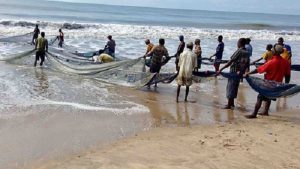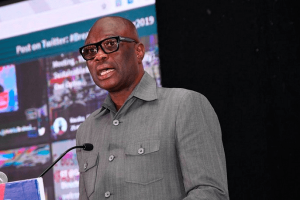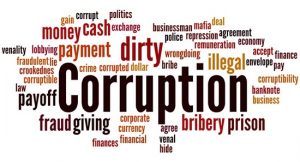At the end of last week meetings were held between government and cocoa industry regulators from both Ghana and Cote d’Ivoire, and officials from Mars Wrigley, the world’s biggest chocolate confectioneries manufacturer to resolve lingering issues relating to the implementation of the US$400 a tonne Living Income Differential (LID) for cocoa purchased from the two countries. Ghana’s representation was led by COCOBOD while Mars Wrigley’s was led by Barry Parkin, its Chief Procurement & Sustainability Officer.
It is anticipated that last week’s meetings will set off similar meetings with representatives of some of the other leading global chocolate manufacturers such as Hershey and Cargill, as the world’s two biggest cocoa producers and their biggest customers seek to calm tensions and resolve disputes resulting from the implementation of LID at the start of the 2020/21 cocoa crop season. LID is passed on in full to cocoa farmers themselves to enable them improve their living standards and indeed its commencement allowed both countries to raise the prices paid to them at the farm gate by nearly 30 percent for the current crop season.
Although all the major cocoa buyers had agreed to abide by the 2019 agreement to pay LID as a premium over and above the global market price, effective from last year, both Ghana and CIV have since caught several of them trying to evade the payments by buying through unauthorized third party sources. This led to a face off late last year during which both countries cancelled their cocoa sustainability programme agreements with some major chocolate firms.
Mars Wrigley, which initiated last week’s talks, was one of them but the company quickly engineered a resolution.
The latest findings by six international civil society platform in the cocoa sector have revealed that some chocolate companies are still failing to pay the living income differential meant to improve the wellbeing of farmers in Ghana and Cote d’Ivoire.
The Easter Scorecard ranking the performance of global chocolate companies reveal they are shortchanging farmers in Ghana and Cote d’Ivoire by not paying what farmers deserve.
The 2021 Easter Scorecard ranks and grades chocolate companies on key sustainability issues.
The key sustainability issues are human rights due diligence, transparency and traceability, living income, child labour, deforestation and climate, and agro-forestry.
Managing campaigner for EcoCare Ghana, Obed Owusu-Addai says the majority of the chocolate companies that were assessed are only paying the base rate determined by the international market and are not paying extra to support the living income of farmers.
“Ghana and Cote D Ivoire managed to get $400 dollars extra money as living income differential for farmers, but what we found out was that these multinationals are using excuses such as COVID pandemic to evade the payment of this extra income,” he explains.
The survey developed by Working together, Mighty Earth, Green America, INKOTA, National Wildlife Federation and Be Slavery Free (Australia and The Netherlands) was sent to the chocolate companies to make an input on the issue.
Mr Owusu-Addai says the companies were selected from the largest cocoa traders and chocolate manufacturers in the industry to smaller innovative companies.
He asserts that many of the chocolate companies are not doing enough to improve the livelihood of cocoa farmers given that 65 percent of cocoa comes from Ghana and Cote D’Ivoire.
He points out that of the 60 chocolate companies sampled in the survey, only few scored high in the key indicators they were marked against.
“We must begin to question these multinational companies when they come with the sustainability programmes they advertise seeking to improve the livelihood of farmers.”
Managing campaigner for EcoCare Ghana also says the chocolate manufacturing companies are not doing enough to address the issue of child labour.
“The ultimate reason why parents take their children to the farm is because of poverty. These multinationals are making billions from the cocoa but they are not investing in the farmers,” he asserts.
He says that the multinationals are also not investing in monitoring programs to curb the practise of child labour on cocoa farms
Cocoa Sustainability programmes are initiatives through which Ghana and CIV commit to the eradication of child labour and undue deforestation in their respective cocoa industries in order to ensure the industry’s sustainability enabling their chocolate making trade counterparties to claim they buy their cocoa only from countries that engage in ethical, sustainable cocoa farming and labour practices.
Deforestation is a major issue in Côte d’Ivoire and Ghana, which together produce nearly two-thirds of the world’s supply of cocoa. Côte d’Ivoire and Ghana respectively lost 25% and 8% of their primary forest between 2002-2019, with a significant portion of deforestation due to cocoa farming.
To end deforestation and restore forest areas, the governments of Côte d’Ivoire and Ghana and 35 leading cocoa and chocolate companies have joined together in the Cocoa & Forests Initiative since 2017.
Mars Wrigley claims that it is committed to paying LID in full to support cocoa farmers and will source over 165,000 metric tonnes from the two countries during the current crop season, this translating into LID payments to farmers in excess of US$65 million.
However, at the recent meetings Mars Wrigley called on both Ghana and CIV to ensure a level playing field by ensuring that all its competitors also pay LID to prevent them from having a distinct cost advantage. Towards this the company will commit to vocally supporting compulsory LID payments by all industry players around the world.
The talks and resultant agreements will be welcomed by both sides. Ghana and CIV have faced problems selling their cocoa with LID added on as COVID 19 has instigated a slump in worldwide demand for chocolate which has put downward pressure on cocoa prices on international markets.
Meanwhile the major chocolate makers have faced anger from retail consumers – particularly in the western hemisphere where most of their sales are made – who have threatened to boycott their products if Ghana and CIV cancel their cocoa sustainability programme agreements.






